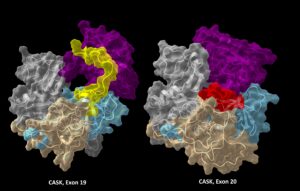Mutations in the gene CASK disrupt brain growth and cause global developmental delay, with the hindbrain (including the cerebellum) disproportionately affected. Here we show that the cerebellum, but not forebrain, remains vulnerable to CASK loss throughout life, and surprisingly, certain CASK mutations affect the forebrain without cerebellar involvement. These mutations disrupt a CASK protein conformation that is specific to vertebrates and likely to have distinct molecular function/s. Based on this evidence, we propose that the mechanisms by which CASK loss affects the forebrain and cerebellum are different and that vertebrate-specific protein conformations are more important for forebrain growth. (By Dr Konark Mukherjee, https://jmg.bmj.com/content/early/2024/04/26/jmg-2023-109747 )
Genetic evidence for splicing-dependent structural and functional plasticity in CASK protein
(Visited 167 times, 1 visits today)
